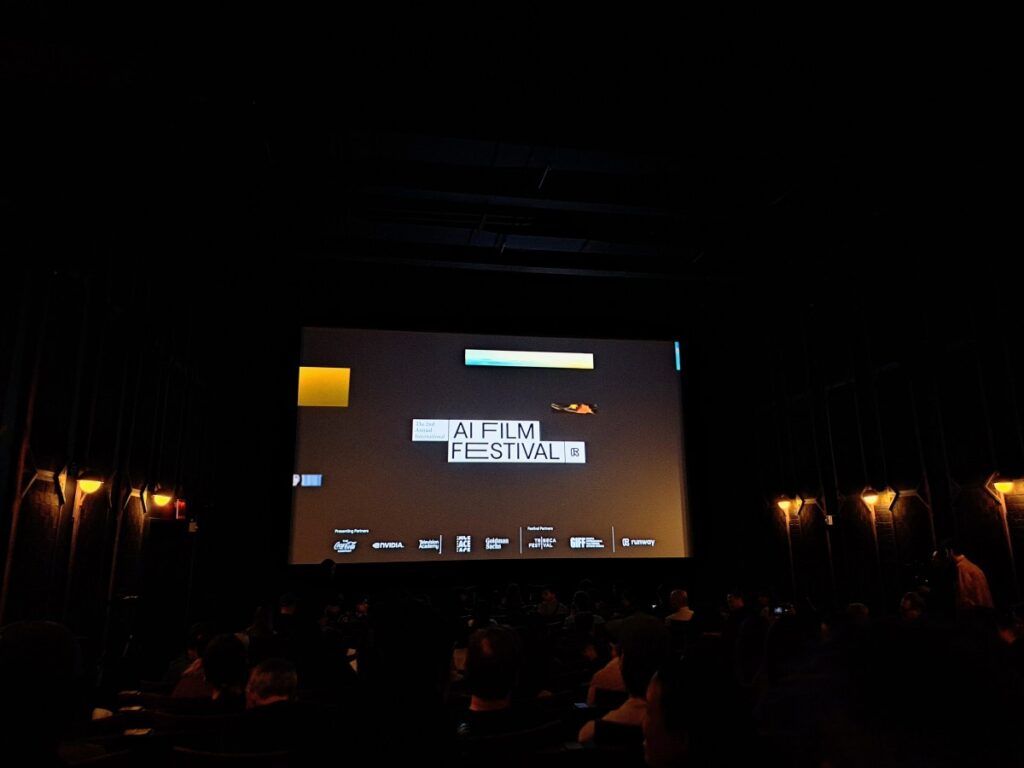In the third episode of Creative Dialogues, an interview series produced by the film production arm of generative AI startup Runway, multimedia artist Claire Henschker discusses how AI is commodifying the artistic process, homogenizing art, and creating certain types of art. They have expressed concern that this may lead to a regression. Derivative identity.
“Aren’t the averages of existing ones getting narrower and narrower?” she asks. “And if it keeps getting averaged out, it all just becomes a lump?”
These are the questions I kept asking myself Wednesday at Runway's second annual AI Film Festival screening of the top 10 finalists, available to watch on-demand on Runway's website as of this morning.
Runway held its first premiere in Los Angeles and second premiere in New York this year. I attended the New York performance at the Metrograph Theatre, known for its art house and avant-garde bookings.

I'm happy to report that AI is not rapidly moving towards the future of the blob, at least not yet. However, a skilled director's eye, or human touch, can make a clear difference in the effectiveness of an “AI movie.”
Every film submitted to the festival incorporated some form of AI, including AI-generated backgrounds and animations, synthetic voiceovers, and bullet-time-style special effects. None of the elements seemed to be up to the level that state-of-the-art tools like OpenAI's Sora can produce, but that's to be expected given that most of the submissions were completed earlier this year. It was within the range.
In fact, it tended to be obvious, sometimes painfully obvious, which parts of the film were the product of AI models rather than actors, cameramen, or animators. Even an otherwise strong script was sometimes let down by underwhelming generative AI effects.
Take, for example, “Dear Mama” by Johans Saldana Guadalupe and Katie Luo. In this work, the story of the loving relationship between her daughter and her mother is told in the daughter's own words. It brings her to tears. But the Los Angeles freeway scenes with the obvious weirdness of the AI-generated video (e.g. distorted cars, strange physics) broke the spell for me.

Due to the limitations of today's AI tools, some movies just didn't seem to work as well.
As my colleague Devin Coldewey wrote recently, control through generative models, especially video generative models, is elusive. Because each shot is created independently of the others, simple problems in traditional filmmaking, such as choosing the color of a character's clothing, require workarounds. In some cases, even workarounds may not be effective.
The resulting disarray was on display at film festivals, where several films were little more than tangentially related scenes strung together by narration and soundtrack. “L'éveil à la création” by Carlo De Toni and Elena Sparacino showed how boring this format can be, with slideshow-like transitions making it a better interactive storybook than a movie .
Leo Cannone's Where Does Grandma Go When She Gets Lost similarly falls into the vignette category, but is nevertheless a heartfelt script (a story about a child's story about what happens after his grandmother dies). ) and the child star's exceptionally strong performances. The rest of the audience seemed to agree. The film received the loudest applause of the night.

For me, that sums up this festival in one word. Human contributions, not AI, often make the biggest difference. The emotion in the voice of the child actor? It stays with me. AI-generated background? Not so much.
This is certainly the case with the festival's grand prize winner, “Get Me Out,” which chronicles a Japanese man's struggle to recover from the emotional toll of immigrating to the United States at an early age. Filmmaker Daniel Antebi uses AI-generated graphics to depict a man's panic attack, which ultimately proves less successful than the cinematography. The film ends with a shot of a man walking across a bridge as street lights dotting the pedestrian lane flicker on and off. It's haunting and beautiful, and it certainly took me a long time to see it that way.

It's very likely that someday generative AI will be able to recreate scenes like this. Perhaps cinematography will eventually be replaced by prompts. It's a victim of ever-growing datasets (albeit with an alarming copyright situation) on which startups like Runway and OpenAI are training video generation models.
But that day is not today.
As the screening ended and the winners marched to the front of the theater for photos, I couldn't help but notice a cameraman in the corner recording the whole thing. Perhaps, on the contrary, AI will never replace something that we humans so desperately desire, such as humanity.


